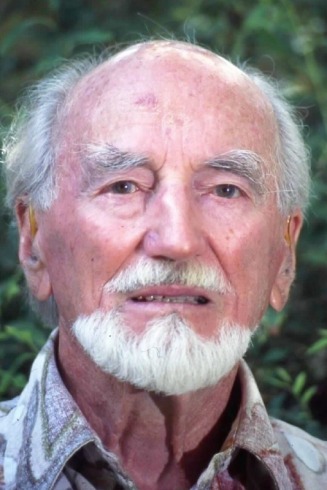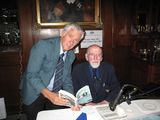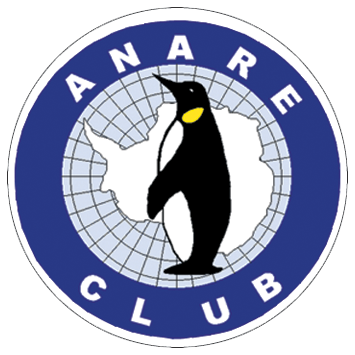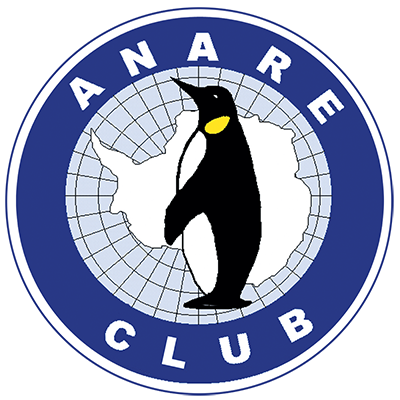
Address by Major Ian Toohill at the Phil Law Science Symposium Melbourne, September 2010
Over the 25 years of our youth we collaborated on several projects and became firm friends.
As an under officer peers have said he did not make friends quickly but when he did they were for life. He had an incredible sense of loyalty; however, he never suffered fools lightly, so I feel quite privileged to have been his friend.
Subsequently to my return from being a larcie in Antarctic he agreed to conduct a series of interviews documenting his life and that process was an off and on process over 20 years and I came to know him extremely well.
Today I want to give you some insight into Phil Law, the man, his personal attributes and the influences in his early life that made him a national treasure that he ultimately became. Phil was the second oldest of six kids. He was led astray by his older brother Geoff – the larrikin of the family, and an example of this is mentioned in his memoirs when they pelted their father, who was a local teacher at the primary school, with small stones one day, as he was coming into class. Phil was caught, Geoff ran away.
After moving to Gardenvale, where his dad became a lecturer at Melbourne Teachers College, the boys would soon discover the Elwood canal and the stormwater drain system, with a network of pipes over a metre in diameter, Phil and Geoff delighted exploring them and soon knew them all like the back of their hand. On one occasion Phil escaped a beating by older bullies by dropping into the drains and losing them. So he was adventurous, right from the word go.
Later at high school in Hamilton, Phil was ambitious and driven in his pursuit of excellence. He became an outstanding sportsman and was always at the top of the class. In those days Phil did, in the shadow of death, continue to believe in Australia. But as he grew older, in contrast to Geoff, he became conformist. Geoff was original, according to his sister Wendy, whereas Phil kept to the rules, when it suited him. Geoff broke them. Phil sought public approval. Geoff did not. Whilst living in Hamilton Phil and Geoff, now in their teens, would go off on bikes, or on foot, with a pack horse into the largely unmapped Grampian Mountains and they would just disappear for weeks. They must have put their poor mother into a fit because in those days, of course, there were no mobile phones and they were really in uncharted territory. But they both returned safely having been very competent at bush work. Phil’s first experience of a scientific expedition was with a friend of his father’s, a geologist, who took both boys up the mountain in the Grampians, and by now adventure was firmly in Phil’s blood. After completing their leaving certificates at Hamilton High School both boys left school and became teachers. In school holidays both continued to go on expeditions in the Grampians.
Initially, Phil was appointed as a junior teacher at Hamilton High School – there with the Education Department. Later he taught at Geelong High when the family moved there. Phil wanted to do medicine and become a doctor on leaving school, but financially the family wasn’t well off, and so that was not an option. Science was the next best thing so he took up a scholarship – a one year scholarship, at Melbourne University. In ’31 Phil went to Ballarat Teachers College, as no places were available for secondary teachers, due to the depression. He received a studentship at Melbourne Uni, as I have said, and at the end of that year he had to continue his studies part time, while teaching at Clunes Higher Elementary School and of course, playing in the local jazz band to supplement his income.
In 1932, Phil took up boxing at Melbourne University and he excelled at it. He became the university featherweight champion in ’36. He believed that boxing taught one to know one’s physical capacity, to overcome fear and physical stress and to be determined in the face of difficulties and never to give in – attributes that were well placed later in life. He believed that fear kills and that his boxing experience gave him the necessary willpower to control it. His brother Geoff thought he was absolutely fearless. These were tough years for Phil, studying part-time with no financial support, other than the small wage supplemented by his music. He was also a great all-round sportsman. Prior to his ANARE career he also excelled in swimming, diving, cross country running, shooting, tennis, cricket and of course Aussie rules, and he was, as I have said, a very competent musician. However, while his career curtailed much of his sports in later years, he kept playing tennis until his early 90’s, often winning. He only gave up playing doubles in around about 2001 when his eyesight wasn’t good enough and he got frustrated because he kept missing the ball.
In ’36 Phil and brother Geoff, decided to experiment with a new sport of skiing. They made wooden skis and Geoff thought Phil was fearless, eventually graduating to Mt Kosciuszko and they did a lot of cross-country skiing there. Obviously there were no lifts in those days. They would go off for extended periods and return with tremendous survival stories. They returned with stubby beards, tanned faces, to tell the family of exciting stories of privations, disaster and ordeals in bad weather. Phil, for the rest of his life believed in a law of luck and he certainly had many scrapes in those days. Skiing also aroused Phil’s interest in cold conditions and adventure and he read books on the exploits of people such as Mawson, Scott, Amundsen and Shackleton and others.
By now he had transferred to Elwood Secondary School, Central School, in Melbourne to try and better himself and complete his Bachelor of Science at Melbourne University. He did so in 1939 and then he was due to go back to teaching, but by this time he could see no way in being satisfied in a career in education, as promotion was snail paced and he started to look for better options. While studying for his Masters of Science he organised fund raising efforts for the war – which had now started- and did quite a lot of work in that field, raising money, for the effort.
In the beginning of ’41, sorry 1940 saw him appointed as a senior demonstrator in the physics department at Melbourne University and he was a tutor as well at Newman College. In the beginning of ’41 he joined the RAAF, for one day, as his professors had invoked the manpower regulations, complaining he was losing too many staff and he was working on optical sites for munitions as part of the war effort. Phil was very embarrassed and had to return to his job at the university – he always needed new challenges.
In 1944, as the acting secretary on the Optical Munitions Panel at Melbourne Uni, he was sent to Papua New Guinea for five weeks, to see firsthand, from the front line, the problems of optical components on binoculars and gun sights which often got covered in mould and so forth in the tropics. In ’45 he met Dr Leslie Martin, head of the physics department at Melbourne University who opened, literally, opened the door to Antarctica for him and the rest, of course, is a matter of historical record.
I would like to talk a little bit more now about ‘Law luck’. Those of you who have read his book ‘You Have Got To Be Lucky’ will be fairly familiar with his philosophy on that. We talk of lucky and unlucky people. Phil based his luck on the laws of probability however – a true science. His belief was we create our own luck – good or bad. A string of good or bad luck has a psychological impact on people. Good luck reinforces positive behaviour, bad luck erodes confidence and becomes a self fulfilling prophesy. Confidence brings success. Phil had no luck with money though, because he was not interested in making it. He once said to me “I never won anything in my life. If I bought shares they went down soon afterwards”. So obviously, if you are interested in things well enough, then luck will follow.
Phil, via his meticulous nature left nothing to chance. In the days before the term, risk management was coined, he practised it intuitively. However there were occasions, where in his own words, as Fred has indicated, the difference between success and disaster was a hair’s breath. Phil manufactured good luck by combining his endless drive, his ability? steadfast and the occasional bit of fool hardiness. As his brother Geoff said, he was absolutely fearless- a little and gutsy. Flying in Antarctic on one occasion with his pilot, doing a reconnaissance, they had virtually completed, it was getting late in the day and the light was failing and they couldn’t find the ship. Flew around for a while, couldn’t find anything, things were getting desperate, so they landed on the sea ice. In the open water they would never have been found. So they radioed the ship and put out some lights on the ice. The plane landed with a few litres of fuel left. Was this Law luck?
Phil’s pilot career began in ’47, whilst lecturing in physics at the University of Melbourne. He was seconded to become the senior scientific officer for the Australian National Antarctic Research Expeditions on the HMS Wyatt Earp. We’ve heard about those exploits.
Australia, as then part of External Affairs established the Division the following year and Phil, of course, became the OIC and the Director. He never wintered over as he had a Division to run, but secretly a lot of the wintering party dreaded the day he might be removed, for due to his passion for hard work. They feared they’d never be left to rest. Public awareness of the Antarctic and Australia’s involvement in it rose sharply in the 1950’s.
The Americans were particularly impressed by what Law and ANARE had achieved. Attention to detail and robust planning provided the capacity for Australia to perform well above its weight on a very modest budget in those days.
A quote here from Dr Des Lugg, who was with the Division for many, many, years as the chief medical officer. “Until his death, Dr Law kept an intense interest in Antarctic matters, especially the AAD – change to organisation, policy, logos, and errors in books or papers gained sharp rebuke as authors and later directors found out. His greatest disappointment was the changing of the name from ANARE to Australian Antarctic Program some 50 years after ANARE became a household word and appeared in the Australian dictionary.”
A little further of the exploits. He shared with it all, through his brilliant communication skills. He was the consummate media man and often appeared in the local papers in Melbourne and around Australia. The post-war communication boom had begun and he was in his element. The press loved his stories. He was passionate about his cricket and always attended Boxing Day tests at the MCG. My father, who also enjoyed the game, told me that during the height of his popularity, and somewhat of a celebrity, the cricket commentators would announce his arrival in the members stand to the crowd and there would be a round of applause.
Phil’s influence on ANARE personnel was considerable and he followed careers with great interest. They may not have all been his friends, but they certainly all respected him. He was just as at home talking to the janitor, as he was to his executive officer or indeed the minister of the day. It is fortunate that due to Phil’s diligence, enormous efforts, the nation has a meticulous record of his life’s work. His insight, wit, intelligence and remarkable memory, which he maintained until his death, have captured the spirit and adventure of a bygone era. He spent many years in so-called retirement documenting and collating his work for future generations.
A little of the awards that Phil received throughout his life. There was a plethora of them, but probably the ones that he cherished the most, was becoming a fellow of the Royal Geographical Society in 1949, when he was awarded the Founders Gold Medal in 1960. This was recommended by Sir Vivian Fuchs and I’d really like to read a letter here that I have got, which really was instrumental in Phil being awarded that Gold Medal, by the Royal Geographical Society.
Dear Larry, it says
As I shall be away south as from the first days of January 1960 I shall not have the opportunity to make any suggestion or comment about the medals and awards for next year. I remember last year Phil Law’s name was put in cold storage for the future (probably no pun intended). I now write to suggest that it would be appropriate for him to be recognised now by the award of a Gold Medal. Although he has not himself wintered he has made many summer journeys to the Antarctic and has been the driving force behind the Australian Antarctic effort. The results of ANARE are now very considerable and are well recognised among polar people around the world. This is very largely due to Law and I would very much like to see him receive this award.
And that letter from someone that Phil, admired enormously, achieved its aim.
It’s a pity that Phil never knew the man that did that for him, because that was only discovered by a family friend, Wendy, when she went to London and discovered that letter only a couple weeks after Phil died.
Phil was one of the most outstanding men in Australia’s Antarctic history. His accomplishments are certainly a matter of fact. His was a life’s service, tireless effort and high adventure in pursuit of science in Australia’s national interest. Not to mention, of course, his latest efforts? To education. Intensive work led to success. He was a born optimist. He used to say he was uniquely prepared for life due to his early experiences in sporting. It was however, Phil Law’s tireless work backed by a dedicated team that earned his greatest reputation for excellence and strong international leadership in Antarctic affairs. He laid the foundations for Australia’s Antarctic Division’s reputation today and upon which the whole edifice of the Antarctic treaty is focused on.
Another little anecdote. You never really ever won an argument with Phil. One night in the early 1990’s, driving home in his Celica, he pulled up at traffic lights behind another car. The driver of the car jumped out and came back and remonstrated with Phil and accused him of having flashed his high beam at him, which of course was not the case as it was simply a bumpy road. So never one to accept false accusations, Phil got out of his car and the argument developed into fisticuffs. Phil’s boxing skills soon had the man back heading to his car with a bloody nose and this was not the only time that Phil resorted to fist-i-cuffs, but we will not go into other occasions at this point.
In addition to foot sport, Phil was a very accomplished musician, as I have said, and obviously he used to enjoy that through most of his life. He also used to entertain the expeditions with his piano accordion during his long journeys south.
Now I would like to mention a little bit about Nel Law and her influence on her husband. Nel was married to Phil for well over forty years, they met at Melbourne University and she was extremely supportive, allowing Phil to pursue his passion. They both made a decision not to have children because Phil’s career really would preclude him from being a good father. And she always took great interest in his career. She set up the first Antarctic Wives Association to keep the loved ones in touch with their own Antarctic men during their long absences. The year Phil decided to take Nel south he had her smuggled on board the ship in Perth when the news broke in the paper a day early that she was going. The minister Casey was there to see the ship off, so a heavy discussion ensued with the Minister and Phil, of course, won the day and she was allowed to go, basically on the premise that the publicity would have been too negative if she had been escorted off the ship. This generated some fantastic publicity for Phil and the ANARE and of course, her paintings as the first Australian woman and artist to visit Antarctica are excellent and they can be seen at the museum in Tasmania.
Another little anecdote. Before Phil left the Division he was cleaning out the safe one day and discovered a stash of heroin, which they had bought many, many years earlier to use as tranquilliser for elephant seal research. What was he going to do with it? So it was very quietly donated to the Royal Melbourne Hospital, who appreciated the donation for palliative care.
A very quick word on Phil’s second career. In ’66 his wife found an ad in the paper one day for someone to set up the VIC, Victorian Institute of Colleges, as an addition to the university system. It was an enormous task and anyone lacking in drive and self confidence could never have stood a chance of achieving the aim. Phil told me the story of standing in Swanston Street one day with nothing but a title and a salary and wondering what to do next. But he didn’t wonder for long. In truth, Phil decided to tackle the task in the only way he knew, head on. He brought all of his Antarctic organisation and leadership skills to bear on this. field. He established a well articulated policy as a top priority and was ceaseless in his public speaking to embed the new philosophy in the public consciousness.
Minister’s must have sighed apprehensively, as a aggressive jutting bearded jaw preceded Phil through their door for yet another pummelling on the needs of the colleges for funding and interviews. However, Phil never lost his passion for Antarctic science and affairs, serving on many committees and writing papers well beyond his official retirement. On his last visit to AAD, only a few years ago, Phil chaired a round table discussion with young scientists during winter celebrations. His enthusiasm for their work was infectious and a robust discussion ensued, which them all had excited about their work and new communication networks resulted.
He also loved his cars and after a few years as a Citroen driver, many years actually, he indulged in a Celica sports car at the age of 90 and promptly lost his licence a couple of times for speeding. Probably the most interesting one was, he let it out on the Hume highway one Sunday afternoon, a beautiful day, to see what it would do – no-one in sight. A few k’s up the road there was a policeman standing there with his hand up. Phil pulls over and says “Oh, how did you catch me?” The copper just pointed to the sky. A helicopter was up there.
So those of us who knew Phil and who admired the man, miss him greatly. Australia, and indeed the world, has lost an important piece of living history. He was a man who always made you feel welcome. He possessed a great enthusiasm and warmth of spirit. Phil was a charismatic and charming man who recognised attributes in others in a way that created instantaneous rapport. He was generous to a fault, thoughtful, rigorous, meticulous and driven. He exercised a holistic approach to problem solving, was determined and a great leader. Phil Law was truly of an excellence man. In many ways, the nation is the richer for the Law legacy. Phil Law was a man for all seasons. A man of destiny.
Thank You.






